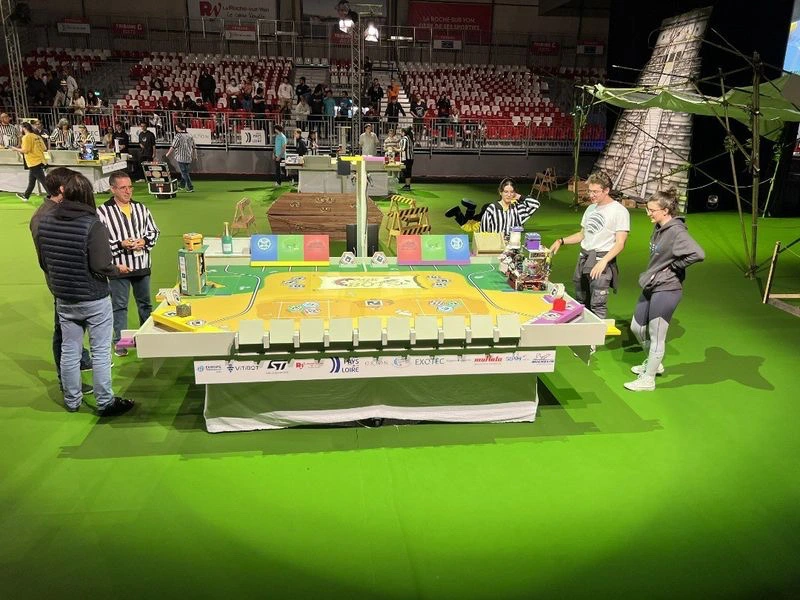Formations | Robotique
Engineering, particularly robotics and mechanics, offers promising careers. General engineering schools such as ESTIA train Industry 4.0 professionals, and stand out for their innovative teaching approach and practical robotics projects.
Robotics engineer: a profession with a future
Robotics engineers are essential to technological innovation. They design and implement robotic systems for industry and the medical sector. The integrator engineer ensures their integration, making this role an undeniable career of the future.
What is the average salary of a robotics engineer?
The salary of a robotics engineer varies. In France, a young graduate can expect to earn between €35,000 and €45,000 gross per year. With experience, this salary can rise to €50,000 to €70,000, or even more in the high-tech sector.
Robotics training: a path of excellence
To become a robotics engineer, there are a number of post-baccalaureate scientific courses available. Engineering schools offer five-year courses, often preceded by an integrated preparatory course. These technical courses provide a solid foundation in engineering sciences, including mechanics, electronics, computing and automation. The engineering cycle deepens this knowledge, with specialisations in robotic systems, mechatronics, artificial intelligence and computer programming languages.
Where can you study robotics in France?
Many engineering schools in France offer cutting-edge training in robotics. ESTIA offers a general engineering degree focusing on the technologies of the industry of the future, including robotics and mechanics. Students learn about robot modelling, computer-aided design, project management and the development of innovative technological solutions. They are also trained in risk analysis and drawing up specifications.
Which school for robotics engineers?
ESTIA is an excellent choice for a generalist course with a strong practical component and an international outlook. It prepares future engineers to work in both small companies and large groups, developing technical proposals and taking part in the activities of an R&D team. General engineering schools like ESTIA train engineers capable of adapting to rapid changes in the sector, thanks in particular to mechatronic robotics platforms and research laboratories. The school also benefits from the Compositadour technology platform, specialising in advanced manufacturing processes and applied robotics, offering a unique environment for project-based learning and experimentation.
ESTIA and its concrete projects in robotics and mechanics
ESTIA stands out for its project-based teaching methods. The "red thread project" is an emblematic example of this. This multi-disciplinary project confronts students with the concrete challenges of designing and building robotic systems. They develop skills in mechatronics, robot modelling (including dynamic modelling and interaction), additive manufacturing and project management. These projects provide an opportunity to apply computer programming languages and to understand the importance of development for functional solutions. The school also emphasises innovation in robotics, preparing engineers for the industry of the future, particularly in areas such as artificial intelligence and signal processing.
What studies are needed for a career in robotics?
For a career in robotics, engineering studies are the ideal route. After a scientific baccalaureate, an integrated preparatory course or a traditional preparatory class leads to the engineering cycle. There are also specialised university courses. The important thing is to acquire a solid grounding in mathematics, physics, computing and mechanics. Schools like ESTIA offer in-depth training in the tools and methods used to design, manufacture and control robotic systems. Students learn to master concepts such as Enterprise Resource Planning (ERP) and to work in teams on technical proposals for advanced technological solutions. In conclusion, general engineering schools like ESTIA are major players in the training of future robotics and mechanical engineers. Thanks to a teaching approach based on practical experience and concrete projects such as the "red thread project", they prepare students to enter industry and become versatile professionals capable of meeting the technological challenges of tomorrow. Whether it's innovation in robotics, robot modelling or project management, these courses offer a springboard to exciting, high value-added careers.
The French Robotics Cup: a collective adventure at the heart of training
Every year, ESTIA students take part in the Coupe de France de Robotique, one of the major student engineering competitions in France. This national competition brings together teams from engineering schools, IUTs and universities with a common goal: to design, program and develop an autonomous robot capable of meeting technical challenges in a limited time. An excellent springboard for those who want to specialise in robotics.
TheESTIA SYSTEM team, ESTIA's robotics association, proudly represents the school at every event. In 2025, its members recount:
"The experience of the French Robotics Cup has been a real challenge. Once again this year, our team of enthusiasts proudly represented ESTIA on the competition field. Months of preparation, exchanges and good times made for a unique and intense experience!"d
"As soon as we arrived, we discovered the unique atmosphere of the event: between passion, tension and excitement, but also a dynamic place with the arenas for the matches, the stands of the other teams and a great conviviality between participants."
Accompanied by teachers from the school and supported by ESTIA's technical and educational ecosystem, the students are involved in a complete project, from the design to the development of the robot. This adventure embodies the collaborative spirit and technical excellence of ESTIA's engineering training, and prepares talented young people to take on tomorrow's challenges in robotics.

